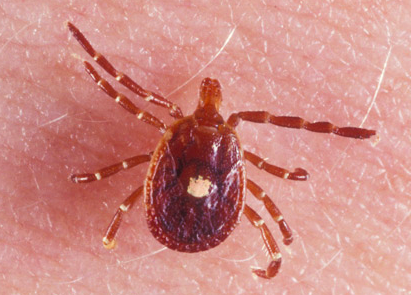As tick season enters full swing in the United States, disease ecologists have already warned that 2017 is expected to be one of the worst years for the parasites in quite some time.
A boom in the population of white-footed mice, which often carry Lyme disease, will increase the number of bites and cases in regions of the country where the rodents carry ticks into areas of likely contact with humans.
- RELATED ARTICLES
- Tips to protect yourself during tick season
- Bring on the cookies: CHOP helps teen crack his allergy to eggs
- Nine uncommon ways to survive allergy season
But while the dangers of Lyme disease are well known, the black-legged ticks that serve as its most common carrier may not be the only concern of Americans enjoying the outdoors in the coming years.
A spreading tick species whose bite carries severe allergic symptoms could be coming to a habitat near you—and spoiling your dinner if you wind up in its path, according to a report from Wired.
The lone star tick, named for the white mark on its back side, has gradually grown in population since the turn of the century as thousands of Americans find themselves suddenly unable to eat red meat without breaking out in hives and feeling their stomachs twist into a knot.
Although native to the southeastern United States, the lone star tick has been popping up in places like Minnesota, New Hampshire and even the eastern tip of Long Island.
Immunologists have been scrambling to log as many cases as possible and determine the cause of such peculiar symptoms. Researchers believe the red meat allergy is traceable to a protein-linked sugar called alpha-gal, short for galactose-alpha-1,3-galactose.
As cases of the "meat sweats" rose throughout the 1990s, University of Virginia immunologist Thomas Platts-Mills began investigating the causes of a such a drastic reprogramming of the immune system. Oddly enough, his early research pointed to a cancer drug that caused patients in the Southeast to experience itching, swelling, low blood pressure and meat intolerance.
It turned out the patients most affected by the drug had developed antibodies to an ingredient in the cancer drug: alpha-gal. Despite its effectiveness, the drug was rife with alpha-gal picked up from the genetically modified mice used to develop it.
With limited data and no official tracking by the CDC, Platts-Mills' research team largely builds its meat allergy incidence map using local news reports. Reserchers believe something in the lone star tick's saliva causes a flood of histamines to be released, although it's not yet clear whether the cause is alpha-gal related or some type of virus-carrying microbe.
Most concerning about lone star ticks is that there is no predisposition to the allergies caused by their bites.
As a next step, researchers will look to determine whether the rise in these allergies is limited to the lone star tick or, worse, whether other species have developed the same capacity to influence the human immune system.


